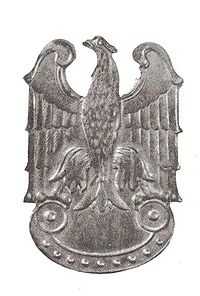Gwardia Ludowa


Gwardia Ludowa (Polish pronunciation: [ˈɡvardja luˈdɔva]; People's Guard) or GL was a communist armed organization in Poland, organized by the Soviet Union created Polish Workers Party. It was the largest military organization which refused to join the structures of the Polish Underground State. It was created in 1942 and in 1944 it was incorporated by the Armia Ludowa.
History
Gwardia Ludowa was created on 6 January 1942. It numbered about 3,000 fighters upon its creation.[1] It was tasked to fight against Germany, by means of partisan warfare, sabotage and reprisal actions. In addition, Gwardia Ludowa was connected to the intelligence services of the Soviet Union. The first partisan detachments (foray groups were organized even earlier) of Gwardia Ludowa were formed in May 1942 near Piotrków and Radom. By the end of the year the organisation was divided onto 7 administrative areas: Warsaw, Lublin, Radom-Kielce, Kraków, Łódź, Silesia and Lwów.
The Lwów area was never fully developed and in 1943 it was passed to the Soviet partisans. Gwardia Ludowa was commanded directly by the head of the Polish Workers' Party. The first commander of GL was Bolesław Mołojec. After his execution in at the end of 1942 by the Polish Workers' Party he was succeeded by Franciszek Jóźwiak.
GL was divided into partisan units and garrison units assembled for quick ambushes (after which the garrison units returned to their homes). By the end of 1942 GL had approximately 5,000 members, including, at least nominally, every member of the Polish Workers' Party. By late 1943 the number rose to about 10,000. Among them approximately 1,700 were partisans, and the rest were part-time combatants.
For the most part, the GL carried out acts of sabotage, including the sabotage of rail transport. However, the units of GL also fought on several occasions against the forces of Armia Krajowa and NSZ.
On 21 July 1944, by a decree of the Krajowa Rada Narodowa, the Soviet-recognized Polish government in exile, the Gwardia Ludowa became a part of the newly formed Armia Ludowa.
Commanders
The prominent commanders and chiefs of staff were:
- Marian Spychalski
- Franciszek Jóźwiak
- Mieczysław Moczar
- Franciszek Zubrzycki
Notes
- ↑ Roy Francis Leslie; R. F. Leslie (1983). The History of Poland since 1863. Cambridge University Press. p. 230. ISBN 978-0-521-27501-9. Retrieved 6 January 2012.
External links
- (Polish) Gwardia Ludowa, Armia Ludowa on the pages of the Polish Institute of National Remembrance
- Biuletyn Instytutu Pamięci Narodowej. 3-4 (62-63) (Spod czerwonej gwiazdy). March–April 2006 http://www.ipn.gov.pl/ftp/pdf/biuletyn3-4_62-63.pdf
|url=missing title (help). Retrieved 6 January 2012.